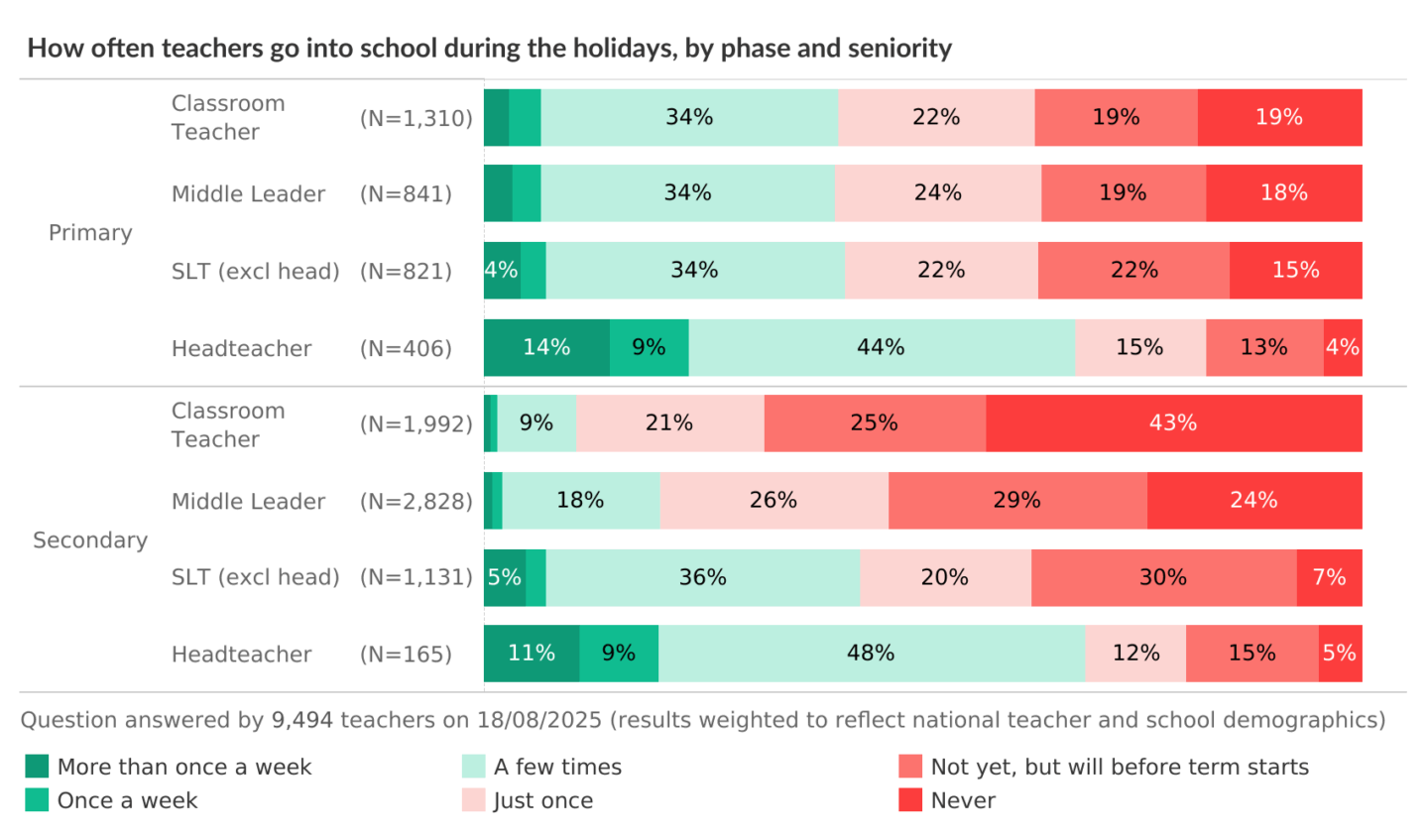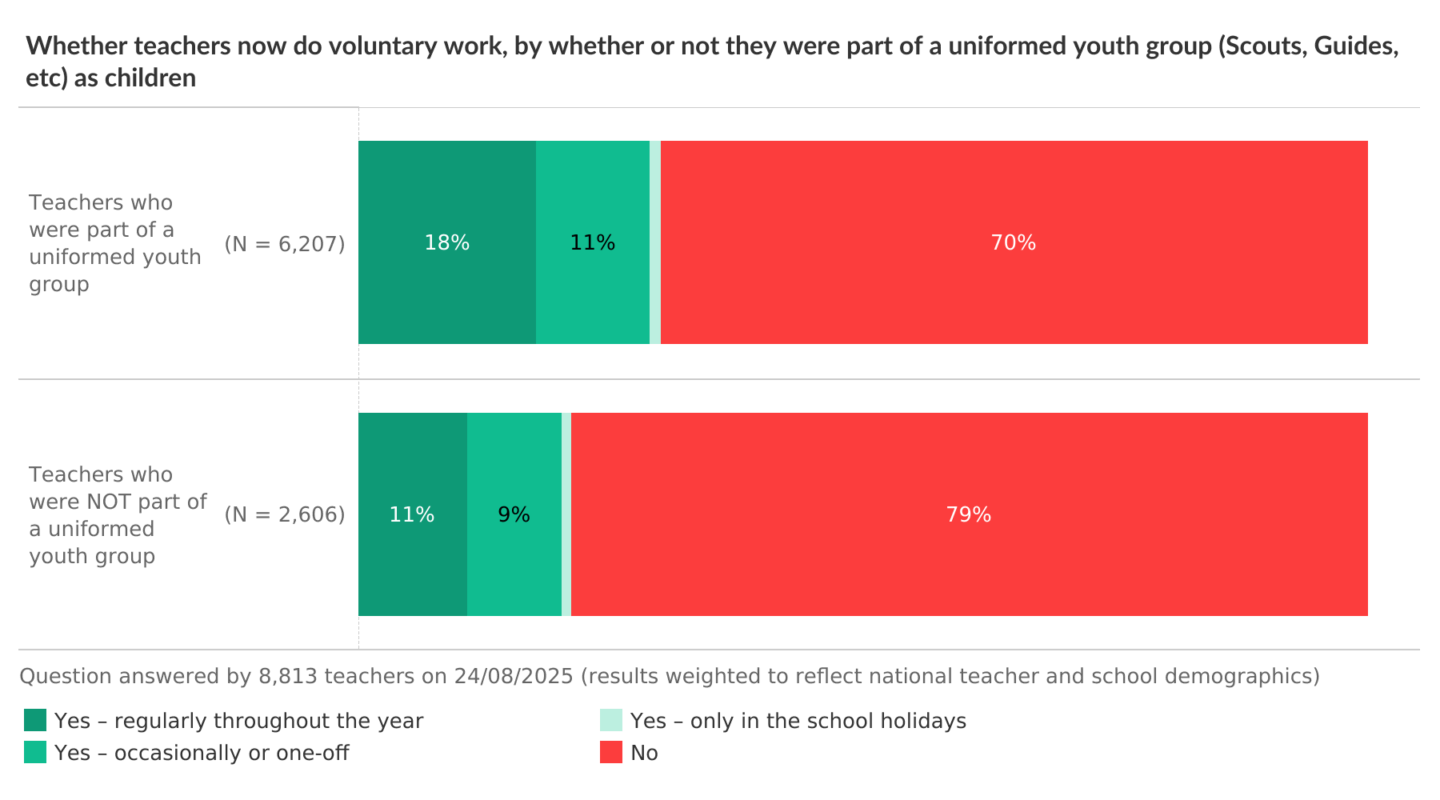
Hello, Tappsters!
The holidays are still going for most of you, but this is the last week for many – so we hope you are able to enjoy and make the most of your last days of freedom!
Prizes for our Mystery Tappers
Today ANOTHER lucky Tapper has a special message in their app telling them they have won a prize – we can now reveal it is a £300 gift card 🤑
Not the lucky winner? No worries! We have ANOTHER mystery prize up for grabs this week!
Full terms and conditions here.
And now, for our best edu-data findings…
1. Working in the holidays
As teachers, you know that the six-week summer holiday rarely means you have a six-week summer holiday.
When asked last week if you had done any school work, 54% reported doing planning or admin tasks either at home or in school.
How often teachers go into school seems to depend on both seniority and phase. 14% of primary headteachers told us they’ve been going in more than once a week (compared to 11% of secondary heads). Meanwhile, primary classroom teachers are much more likely than secondary classroom teachers to report going in “a few times” (34% vs 9%).

2. Talking accents
No one should face prejudice because of their accent — not in schools, not in the workplace. And yet, last week’s Teacher Tapp results show that teachers themselves often experience it. What’s more, it doesn’t just come from students, but sometimes from colleagues too.
Here’s what we found:
- 26% of teachers say their accent is stronger than their colleagues’ (7% say much stronger).
- 48% say their accent is broadly similar.
- 26% say their accent is less strong than colleagues.
More than 1,500 of you wrote in to tell us more about your experiences of teaching with an accent (1,524 to be exact!). There were stories about prejudice from colleagues, parents and students, but also the tricky task of teaching phonics, and those who have been able to use their accent to their advantage.
Accent can really shape life in the classroom. Some teachers told us it makes phonics harder: “It makes phonics tricky at times – I’m northern and so the way I say vowels can be different.”
Others described the sting of prejudice: “Once a group of sixth formers went to the leadership and questioned my qualifications as somebody so northern could not be trusted to teach A-level.”
And for many, adapting their voice has become second nature: “My accent at work is not my real accent. I code switch and make myself sound more ‘proper.’”
Reactions from Students
Teachers with much stronger accents were far more likely to report negative reactions from students compared to those with accents similar to their colleagues (47% vs 17%).
Reactions from Colleagues
The starkest findings came from colleagues: 57% of teachers with much stronger accents said they’ve received negative comments from colleagues. Only 5% of teachers with accents similar to their colleagues reported the same.
3. Were you a Scout or Guide – and are you now more likely to volunteer?
After last week’s question on voluntary work, a Teacher Tapper got in touch with a great idea: why not ask if teachers who were part of a youth group (like the Scouts or Guides) as children are more likely to volunteer as adults?
So we did!
First up, lots of teachers already give their time: 15% volunteer regularly throughout the year, 11% volunteer occasionally, and 1% do voluntary work during school holidays.
It also turns out that 70% of teachers were in a uniformed youth group as children. But does that early experience make a difference later in life? The answer seems to be yes: teachers who were in youth groups are more likely to volunteer regularly as adults (18%) compared to those who weren’t (11%).

However, background matters too. When we checked this against last year’s question about class identity, we found that teachers who grew up middle-class were more likely both to have attended youth groups (75% vs 64%) and to volunteer as adults (19% vs 13%) when compared to teachers who grew up working-class. So, it’s fair to say that there is likely to be more going on here than just donning a uniform and camping as a child, and volunteering as an adult.
+ BONUS FINDING
Actuaries to Army Officers: What Did Teachers Do Before Teaching?
Some people always knew they wanted to teach. Others took a more winding path, arriving in the classroom after years in different careers. But how common is that?
Our results show that 55% of teachers went straight into teaching as their first career. The rest? They tried other jobs first — and a quarter had careers lasting more than five years before making the switch.
So, what kind of jobs did teachers do before they became teachers? Here are just a few you shared with us:
- “Before becoming an English teacher at 41, I was a barmaid and a dinner-lady.”
- “Retrained as a Maths teacher just before I reached 50!”
- “19 years in Local Government before being made redundant at 40 years old and then doing a PGCE to become a teacher.”
- “Nursery nurse, teaching assistant, some admin work while completing my degree then teaching.”
- “I was an Actuary (25 years) and then a stay-at-home mum (10 years) before training as a primary teacher at 50.”
- “Army Officer.”
From pubs to pensions, boardrooms to barracks – the journey to the classroom can start anywhere! It’s a reminder that the route into teaching isn’t always straight — but it can be incredibly varied and inspiring.
Daily Reads
Results day for GCSEs was last week – and this Tes article on the key findings was our most read – 13% of secondary Teacher Tappers clicked and read it!
For primary tappers, the most popular blog was all about classroom displays! 11% of primary tappers read these tips on improving your classroom environment.
Have you seen a great blog you think would make a great daily read? Let us know by emailing england@teachertapp.co.uk and we will check it out!


